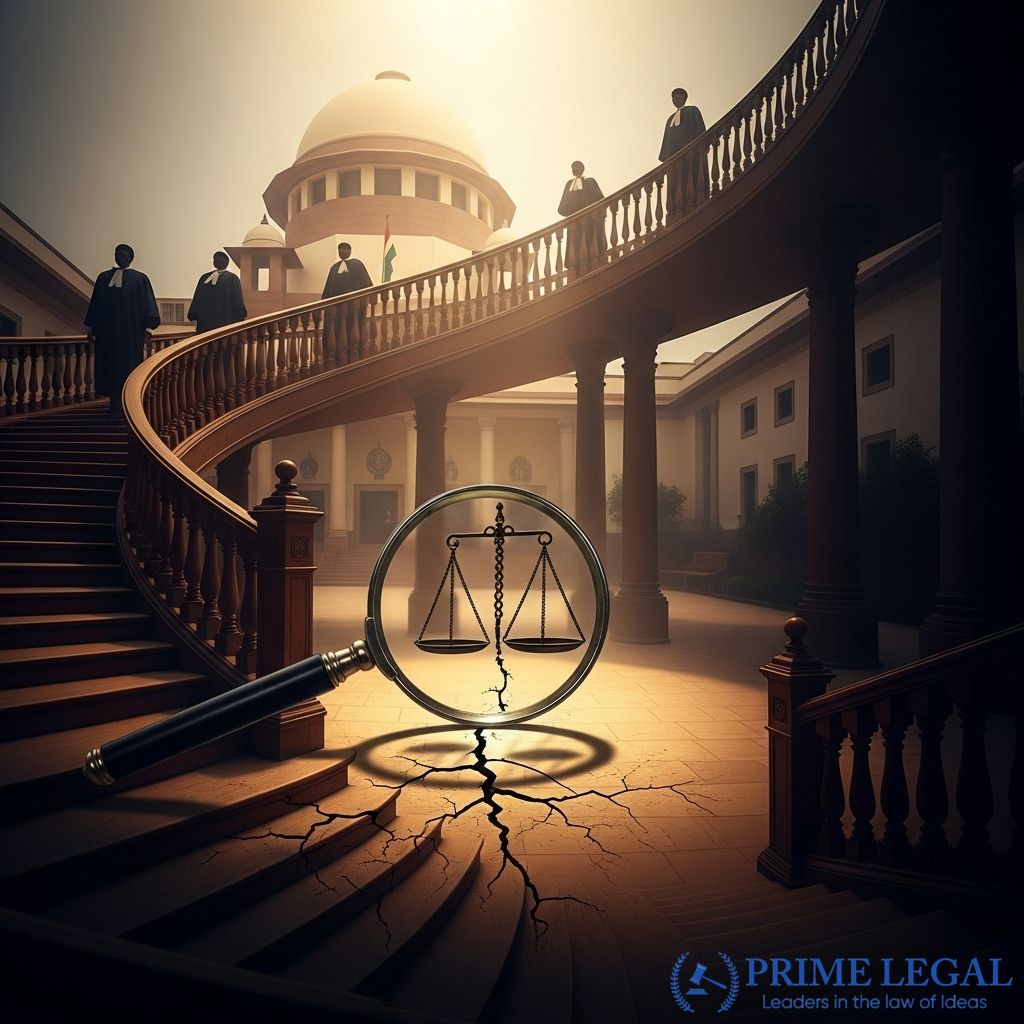Introduction
The Supreme Court has recently referred to a five-judge Constitution Bench the issue of judicial officers’ promotion structure and eligibility for direct recruitment as District Judges under the Bar quota. The problem of stagnation within the subordinate judiciary is an ongoing debate. The case concerned is REJANISH K.V. vs. K. DEEPA [Civil Appeal No(s). 3947/2020].
Background
Articles 233 to 235 of the Constitution outline the process of appointments. Under Article 233(1), District Judges are appointed by the Governor in consultation with the concerned High Court. Clause (2) of the same Article introduces the “Bar quota,” allowing for direct recruitment from among practicing advocates who have not less than seven years of practice and are “not already in the service of the Union or of the State.” Over the years, the Court has clarified how these appointments should take place.
However, there exist practical challenges. The plea raises concerns over stagnation in career and disparities in pay and promotion opportunities among officers in the subordinate judiciary. A bench comprising CJI B.R. Gavai and Justice K. Vinod Chandran passed the reference order while hearing a plea filed by the All-India Judges Association. This move could lead to a revision of earlier precedents. The problem mainly relates to concerns over promotion to the District Judge cadre.
Key Points
Legal Question- The controversy relates to the interpretation of the phrase “not already in service” in Article 233(2). Judicial officers who had prior experience as advocates before joining the subordinate judiciary argue that their earlier practice should count toward the seven-year requirement. Hence, they should not be barred from the Bar quota.
Precedential stance – The Bar quota refers to the portion of posts in the Higher Judicial Service, primarily District Judges, that are filled by direct recruitment from practicing advocates rather than by promotion of existing judicial officers. The exclusion of judicial officials from the Bar quota is claimed to lead to stagnation in promotions. In the case of Dheeraj Mor, it was held that once a person joins the judicial service, they cannot be “not in service,” and thus they are ineligible to apply under the Bar quota, as they are deemed to be in service according to Article 233(2). It highlighted that the Constitution intended to maintain two sources of recruitment, one from within the service and one from outside the service. So, there can be no overlapping by allowing them to apply under the Bar quota. [Dheeraj Mor v. High Court of Delhi, (2020) 7 SCC 401].
Practical concerns- Due to the above reasoning, many judicial officers faced challenges. They joined at a young age and often retired before reaching the District Judge level due to stagnation. In many states, 25 percent of District Judge vacancies are reserved for direct recruits. Due to this, opportunities for promotion within the judicial ranks are limited. It was also highlighted that this career stagnation leads talented officers to resign as well as deter new applicants for a place in the subordinate judiciary.
Two sides of the story- There are conflicting views in this case. Senior Advocate Siddharth Bhatnagar, who appeared as amicus curiae, had suggested a fixed percentage of posts in the Principal District Judge cadre be reserved for promotion from among officers appointed as JMFCs to ensure balance. However, Adv. R. Basant opposed it by highlighting the need to create a distinction between officers who enter the judiciary through the entry cadre and those directly appointed as District Judges through competitive examinations.
Middle path to be taken- The Court acknowledged these concerns and decided to revisit the issue. Since the matter concerns constitutional provisions and has a great impact on judicial officers, the court referred it to the Constitution Bench under Article 145(3).
Recent developments
The Constitution Bench passed a landmark judgment today by overruling the Dheeraj Mor case. The court held that a judicial officer with a combined experience of seven years as an advocate and a judicial officer is eligible to apply for direct recruitment as a District Judge. The only requirement is that the in-service applicants must have reached the age of 35 years to apply for such posts. It also rejected the plea for a 25% quota for practicing advocates under Article 233(2) to ensure a level playing field. It highlighted that judicial officers gain significant practical experience and undergo rigorous training, which is often more than what comes from legal practice.
Conclusion
For a long time, judicial officers have been discontented with the system, as they rarely made it to the District Judge level despite contributing more than 15-20 years of their lives to the system. The court overruled the Dheeraj Mor case, emphasizing the need to promote efficiency and attract young talent to the higher judiciary. It applied the doctrine of level playing field and observed that meritorious judicial officers should not be denied the opportunity to compete with advocates. The court, while acknowledging that Article 233 (2) does not provide for this interpretation, highlighted the need to have a purposive interpretation of Article 233 as a whole.
“PRIME LEGAL is a full-service law firm that has won a National Award and has more than 20 years of experience in an array of sectors and practice areas. Prime legal falls into the category of best law firm, best lawyer, best family lawyer, best divorce lawyer, best divorce law firm, best criminal lawyer, best criminal law firm, best consumer lawyer, best civil lawyer.”
WRITTEN BY: FARZEEN ZAMAN


